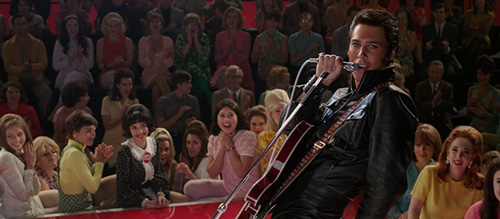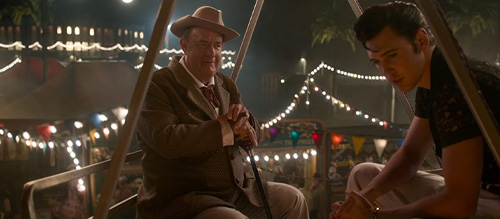Elvis (2022) Review

Elvis (2022)
Director: Baz Luhrmann
Screenwriters: Baz Luhrmann, Sam Bromell, Craig Pearce, Jeremy Doner
Starring: Austin Butler, Tom Hanks, Olivia DeJonge, Helen Thomson, Richard Roxburgh, Kelvin Harrison Jr, Xavier Samuel, David Wenham, Kodi Smitt-McPhee
You certainly know you’re watching a Baz Luhrmann joint when, just a couple of seconds into Elvis, you’re proudly presented with the Warner Brothers shield bejewelled with rhinestones. The whirlwind film that follows, full of hyperactive cinematography and editing, flights into vivid fantasy, and enough audio-visual razzmatazz to make the King of Rock and Roll himself proud, cements the film as perhaps the Australian auteur’s magnum opus. Strap yourself in Baz devotees, because you’re in for a treat.
Showbiz huckster extraordinaire Colonel Tom Parker (Tom Hanks) is on his deathbed and looks back on the part he played in the making of the career of Elvis Presley (Austin Butler) four decades earlier. We follow the duo’s fateful meeting, the rise and fall of one of the greatest rock ‘n’ roll stars of all time, and how the Colonel struggled to retain control of his star and his far-reaching ambitions.
From the moment he steps on screen, shakes off the character’s stage fright and opens his mouth, Austin Butler is Elvis. It has been observed that Butler doesn’t resemble Elvis all that closely, and if you put still images of the pair side by side that is certainly true, but somehow when in motion he undergoes an uncanny transformation. The hypnotic charisma, the animalistic sexy movements and perfect vocalisation of early Elvis numbers (Butler lip-synced to recordings for the bigger sound of The King’s later Vegas career) all combine to complete a powerful spell.
From pelvis-thrusting in a candy-pink suit while playing Country music standards to reinventing himself as a leather-jacketed bad boy and again as a glamorous god of the stage, Butler as Elvis completely makes you buy just why all the girls and a fair few of the guys in every audience fell for him. These aren’t quite full-blown musical sequences, but nor are they locked-off and stagey, Mandy Walker’s (Hidden Figures) camera weaving between Elvis’ legs, whirling around the captivating stage show he is giving, and taking in the reactions of his hysterical fans.
Elvis’ influences from mostly African American artists are rightly acknowledged, and several scenes of him enjoying the vibe of the coolest blues bars on Beale Street in Memphis, Tennessee with the likes of BB King (Kelvin Harrison Jr), Little Richard (Alton Mason) and Sister Rosetta Tharpe (Yola) really bring home his position as a performer between worlds. He grew up with this music all around him in a melting pot of cultures, and it is clear that being a part of a poor white family living in the segregated South led to him becoming a true game-changer. He stood out from the other good looking white boys with angelic voices by performing and sounding like his Black idols, inevitably courting his fair share of controversy in the process for blurring those boundaries.

It is extremely difficult to judge for certain whether Tom Parker is a good Tom Hanks performance or not. The heavy prosthetics, which cast doubt in the trailers, do look much better in the final film, and Hanks plays a funny-sinister character pleasingly, but a man who was an evil cartoon character in real life becomes even more so when you’ve got the actor trying to compete with the hugeness of the story of Elvis Presley. Parker has to act as the story’s chief villain and its unreliable narrator, and the effectiveness of the latter role is certainly impacted by the fact that he comes across as such a comical figure.
Elvis’ highest peak is contrasted with the Colonel at his lowest and most duplicitous, striking a shady deal on a napkin with hotel dons as his creation completes his ascension to godhood by belting out “Suspicious Minds” with full orchestral backing in Vegas.
Much is made of Elvis being the showman and Parker being the snowman. Snowman in this case refers to trickery and deception and a secret made-up society Parker made himself the leader of. You might need both to make a successful performing career, but you won’t be happy trying to balance creative fulfilment with remaining profitable, as shown in the many scenes in which Elvis is prevented from touring and musical experimentation by Parker’s obsession with safe, lucrative business moves like movies and Christmas specials (though hearing him at the end of his tether and making the frankly naff demand of Presley at his famous 1968 Comeback Special – “He will play Here Comes Santa Claus!” in that unique accent – is an unexpected joy).
Not many characters who aren’t the King or his meddling manager get their time to shine, Elvis’ parents (Helen Thompson and Richard Roxburgh) and Priscilla (Olivia DeJonge) in particular have to fight for truly memorable moments which is a shame because of how important they were in Elvis’ short life. And, unfortunately, even Luhrmann can’t resist the pull of musical biopic convention forever. This might not be a bog standard strictly chronological telling of a superstar’s life story (see: Bohemian Rhapsody), but nor is it quite as winningly freeform and dreamlike as something like Rocketman as we progress beyond Presley’s rebellious early career.
Moulin Rouge! is probably still Baz Luhrmann’s best film, but Elvis is his “most” film. Everything in Elvis is turned up to eleven, pretty much all of the time. Elvis super-fans might take issue with the way certain key events in The King’s life are represented, Luhrmann clearly has next-to-no interest in Elvis’ flash-in-the-pan film career and if you’re not already a fan this more-is-more directorial style this certainly won’t change that. What Elvis really succeeds at is capturing the revolutionary spirit of arguably the biggest American music icon, and showcases his unmatched and far-ranging back catalogue in performance scenes that live up to the promise of the Greatest Show on Earth.
Score: 19/24


“Elvis” was a thrilling, whirlwind of a movie, It was closer to “Nightmare Alley” than
“Viva! Las Vegas.” The Faustian pact which linked Elvis to Tom Parker led to his
eventual heartbreaking destruction, aged only 42. Even so, at the peak of his powers,
nobody came even close to matching him. Austin Butler’ gave a once-in-a-lifetime
performance as the King. From his humble beginnings to his forlorn death, the viewer cannot take his/her eyes off from him. He was truly incredible.
Tom Hanks has divided opinion as the amoral conman Tom Parker, but since the story is told through his eyes he will have the last say on the matter. Parker comes
across as greedy and uncaring,always looking to squeeze the last drop of money from Elvis. He eventually bled him dry financially, creatively and physically.
A true vampire. The visuals were exciting and the story fast paced.
It was a three hour film that felt like ninety minutes. After it had finished, my partner
and I thought it wasn’t long enough. If you are an Elvis fan, you will love it.
If you are not an Elvis fan, you will love it ! . It really is that impressive. 9/10